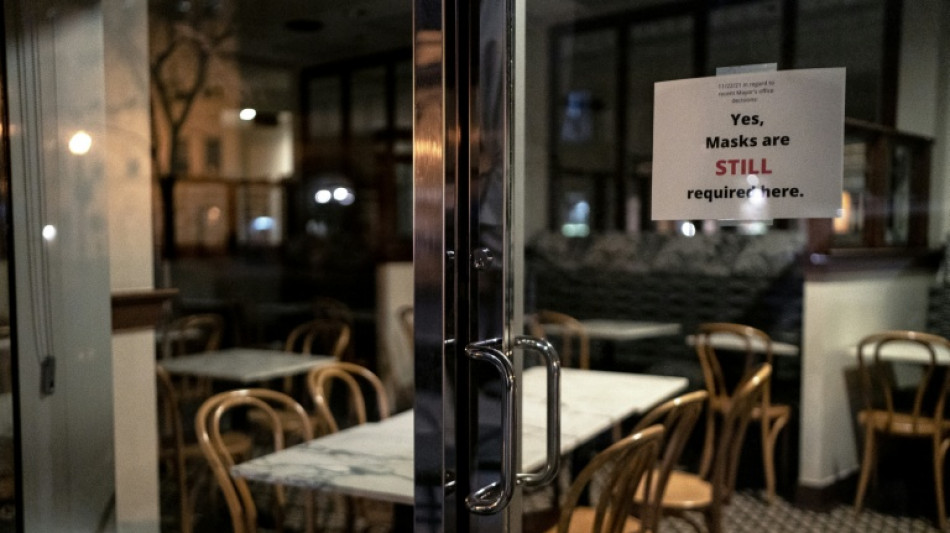
| RYCEF | -2.8% | 9.64 | $ | |
| CMSC | -0.15% | 22.43 | $ | |
| RBGPF | 1.47% | 68 | $ | |
| BCC | 0.57% | 98.865 | $ | |
| JRI | 0.54% | 12.94 | $ | |
| VOD | -1.05% | 9.352 | $ | |
| BCE | 0.15% | 23.005 | $ | |
| SCS | -0.59% | 11.035 | $ | |
| NGG | -0.17% | 65.46 | $ | |
| RIO | -1.96% | 59.855 | $ | |
| CMSD | 0.02% | 22.715 | $ | |
| RELX | 0.17% | 50.245 | $ | |
| BP | -0.2% | 33.794 | $ | |
| GSK | -0.67% | 38.482 | $ | |
| AZN | -0.84% | 73.175 | $ | |
| BTI | 1.78% | 41.245 | $ |

Taco-a-day or meal-a-month, US restaurants join subscription craze
For Jebin Tuladhar, the past two years have been like walking a tightrope as he tried to steer Shanti, the Indian restaurant chain he manages in Boston, through the pandemic.
To cope, Shanti in June started offering customers at the restaurant's three locations in and outside the city a subscription deal where a gourmet meal for two costs $80 each month.
The plan now has about 80 subscribers, and Tuladhar estimates that if he adds about 10 additional accounts each month, Shanti can soon reach the breakeven point of 160 subscription.
From those offering fast food to others where white tablecloths are the norm, restaurants across the United States are rolling out subscriptions to bolster their damaged businesses and lure back customers who were scared off by the pandemic.
In Washington, Italian restaurant La Collina launched a "Pasta Club" where, for $85 a month, customers receive two deliveries of pasta with sauce homemade by chef Katarina Petonito. About 60 households have been won over so far.
"There is no denying that the pandemic has caused restaurants to pivot and learn new ways to connect with guests," said Danya Degen, director of operations for Eastern Point Collective, the company of which La Collina is a part.
- Building loyalty -
Cafe chain Pret a Manger is offering US customers as many as five coffee drinks a day for $19.99 a month, a program that started last September after a successful trial run in Britain.
In January, Taco Bell rolled out the "Taco Lover's Pass," which allows you to order one taco a day over a 30-day period for $10.
The fast-food giant is presenting the program as time limited but has set no deadline for it to end and is more or less treating it as an experiment.
"Our goal for the Taco Lover's Pass test is to examine how our consumers engage with this unique offering that ultimately pays for itself in just a few visits," Taco Bell's Chief Digital Officer Zipporah Allen said.
David Henkes, senior principal at restaurant consultancy Technomic, said these subscriptions can be both profitable and helpful to companies looking to expand their customer base.
"You want to remain top of mind with your loyal customers," he said. "What you're really hoping to do is drive that engagement with the consumer."
Besides fast food, most outlets that have launched subscriptions rely primarily on home deliveries because of the pandemic, but they don't plan to stop there.
The Wells, a bar owned by Eastern Point Collective, has created "Gin Society," whose members get the ingredients for a cocktail sent to their homes each month, and also priority reservations and exclusive access to new drinks and food when visiting the bar.
In Boston, Shanti's owners plan to introduce a new subscription next month, which would cover a certain number of dine-in meals at the restaurant.
"Right now, I don't know what's going to work out," Tuladhar said.
Several companies have been set up to support these subscriptions, including Table22, which is collaborating with Shanti and La Collina, and the Summerlong Supper Club in New York, which launched a four-month subscription-based program early last year with 16 partner restaurants.
The latter, which has had more than a thousand people sign up, focused on higher-end restaurants, but the trend seems to have a future at all price points.
A pioneer in the sector is Goldbelly, which has several hundred partner restaurants offering barbecue, pizza or cake submissions, and raised $100 million from investors last May.
If the trend endures, it will join gyms and streaming services among the ranks of things American consumers are willing to pay monthly for.
When it comes to restaurants, "all of these people are realizing that making food and selling it at the very basic level is a very risky proposition," said Vinay Gupta, owner of Summerlong Wine, one of the driving forces behind the Supper Club project.
Subscriptions "essentially take the risk off of yourself, and put it on to the consumer," he said.
J.M.Gillet--JdB



